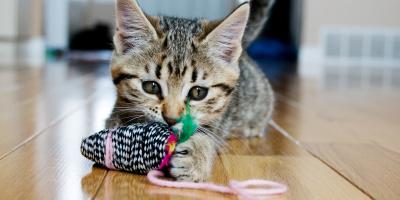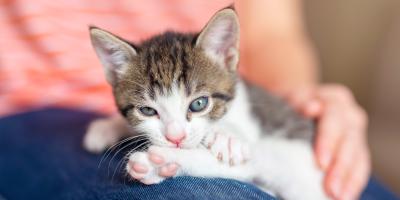Your kitten’s behavior may seem like a mystery, but the seemingly random things she does serve another purpose. These behaviors help her develop into a healthy adult cat.
Though kittens are tiny and cute, they’re constantly growing and learning, and even when they appear to be grown, they’re not quite adults until they reach the age of about two years old. Helping them socialize during this developmental period requires for them to be gently handled by people for at least 15 to 40 minutes each day.
Kittens who get this kind of love and attention during their first seven weeks are more likely to be comfortable around humans and in new situations, such as at the veterinary clinic.
Nutrition plays an important role in a kitten’s development, too, which is why it’s important to find kitten food with the right amount of proteins and the right ingredients to help her grow and thrive.
Kitten Development by Week & Associated Behaviors
Weeks 1 to 7
Even before the age of seven weeks, kittens are already becoming social. By the third week, they can see well enough to find their mothers, and by week four, they seek out their littermates. Kittens start to groom themselves and other cats at week five.
Around this time, they start running, stalking and pouncing, all with an adorable fierceness. This gives them the opportunity to learn appropriate social behaviors, like the difference between a play bite and a real bite, and how to keep wrestling playful (and not painful). Avoid teaching your kitten that your hand is a play object and play with her using a toy instead.
Weeks 7 to 14
Once week seven arrives, playful kitten behavior really ramps up. Before, your kitten was limited to her mom and littermates, but now there seems to be a whole new world for her to play and romp around in. If she can stalk it, chase it, pounce on it, bat it around or catch it in her mouth and claim victory, she’s ready to try it (something to keep in mind as you kitten-proof your house).
The play period when kittens are most active is usually between 7 and 14 weeks. While it might look like your kitten is all play and no work, remember all these kitten behaviors are helping her learn about her world and sharpen her instinctual hunting skills. They also help her develop that signature feline balance and agility.
This is a great time to introduce toys that entice hunting and play activity to encourage her to continue honing those skills.
Months 4 to 6
Object play in kittens peaks around five months of age, so you’ll want to make sure that you spend lots of time playing. Providing a variety of toys for when you’re away will allow her to continue expressing these play behaviors.
Months 6 to 18
Your kitten will continue developing after 6 months of age, so it is important to continue spending time with her and reinforcing all the training you have done so far. If she’s a bit hesitant with a few things, take these months to continue working on them in a calm and positive manner.
Kitten Growth Stages
As she goes through the different kitten behavior and growth stages, remember that random and quirky though they may seem, every behavior has a purpose. Over time, these quirky behaviors will transform your kitten into the unique, entertaining, intelligent, charismatic (and occasionally exasperating) cat she was born to be.
Get more tips on kitten growth and behavior from our experts on our Pet Expertise page.

Be Rewarded for Your Purina Purchases
Earn and redeem points for Purina products with myPurina app.








